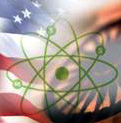
With the days approaching faster for the Nuclear Suppliers Group (NSG) meeting scheduled on August 21-22, the United States has accelerated its process to get a clean exemption for India on the nuclear deal. The US is expected to bring the draft for consideration at its Congress by early September.
US ambassador to India, David C Mulford, currently in US, during his telephonic press conference on Tuesday said that President Bush and Secretary of State, Condoleezza Rice themselves are having hectic parleys with the NSG member countries to provide India green signal in terms of “clean waiver” to facilitate the civil nuclear deal between the two countries.
The US government wanted to give Congress enough time for consideration for the ratification of the deal. So it wanted to submit the legislation in the Congress by September 8, Mulford said.
NSG waiver however is not easy to get as India will certainly face the trouble over the language of the draft, which says “unconditional exemption.” There is no such thing as an unconditional exemption at the NSG. “I personally believe that the word ‘unconditional’ will be indigestible by the NSG countries, we are looking at the ‘clean exemption’ at NSG.”
Mulford advised India not to use the word ‘unconditional waiver’ for the clearance from the 45-nation NSG, as it will be provocative at the NSG meeting, the External Affairs Minister Pranab Mukherjee said: “India expects the NSG guidelines to be amended.”
Secondly, NSG expects India to accede to the Nuclear Non-Proliferation Treaty, which India has repeatedly rejected. Some countries namely Brazil, Ukraine and South Africa which are NPT signatories and have had to rollback their nuclear programmes as per the requirement of the treaty, will certainly be vocal against the exemption for India.
The good piece of news for India is that the US administration, realising former’s concern that it will not sign NPT, has carried out discussions with the NSG countries for the finalisation of the draft waiver.
The apprehension is looming over New Delhi and Washington that the NSG still not ready to give the nod by consensus to allow international nuclear trade with India. This assessment has been further reinforced by the tough stand adopted by Switzerland, Netherlands and Norway.
Delays at the NSG stage will make it tougher for the Bush administration to push the nuclear deal through Congress, which is not likely to convene for a lame duck session. The US Congress will adjourn on September 26 and will have very little time for debate on the nuclear deal. However, Bush administration has expressed hope that it will complete the deal within the limited time.
If, for a while, it is believed that the present US Congress could not approve the deal, India could then too have a sigh of relief as the successor of the US government either Republican John McCain or Democrat Barack Obama are not adverse to the Indo-US nuclear deal.
|
|


Comments: